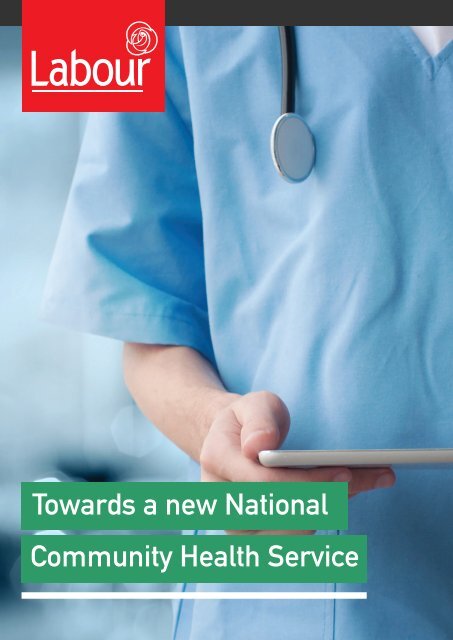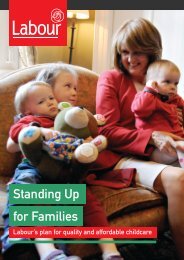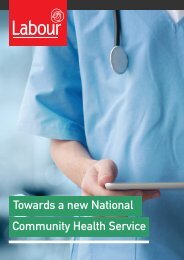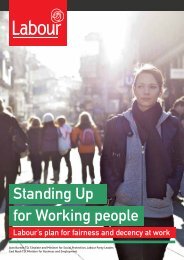Towards a new National Community Health Service
1Kfkmje
1Kfkmje
You also want an ePaper? Increase the reach of your titles
YUMPU automatically turns print PDFs into web optimized ePapers that Google loves.
<strong>Towards</strong> a <strong>new</strong> <strong>National</strong><br />
<strong>Community</strong> <strong>Health</strong> <strong>Service</strong><br />
Labour <strong>Health</strong>care doc.indd 1 11/02/2016 15:04
Our plan<br />
• Universal GP Care. We will introduce a New <strong>National</strong> <strong>Community</strong> <strong>Health</strong> <strong>Service</strong>. We have<br />
introduced the first steps with free GP care for children under 6 and people over 70, and will<br />
continue to roll out free GP care for all. This essential work will be championed by a <strong>new</strong><br />
Cabinet Minister with responsibility for primary care.<br />
• Moving towards Universal <strong>Health</strong> Care. The majority of our health care needs can be met<br />
at community level. This means that many services which are currently provided in hospitals<br />
should be provided in the community. These services will include areas such as mental<br />
health services, care of the elderly, and disability services.<br />
• Progressing smarter strategies for tackling the waiting lists crisis and A&E<br />
overcrowding. This is not simply about more resources but about working differently.<br />
As a start Labour will recruit additional health professional staff, but we will also roll out<br />
initiatives specifically designed for quick and early assessment of patients waiting for<br />
diagnosis and treatment.<br />
• Reduce the costs of necessary medication. We will reduce the threshold of the Drug<br />
Payment Scheme to €100 for families and €75 for single persons and deliver lower<br />
prescription charges capped at €20 per month.<br />
• Enhance accountability in the management of the Irish <strong>Health</strong> system. We are<br />
committed to addressing the causes behind long waiting lists; weak budgeting, insufficient<br />
capacity and staff, and poor management. Our plan seeks to address key issues of corporate<br />
governance, financial planning, ministerial oversight and responsibility.<br />
In government, we have taken<br />
the first steps, prioritising free GP<br />
care for the youngest and oldest<br />
in our society, and completing the<br />
construction of 90 primary care<br />
centres across the country<br />
2<br />
<strong>Towards</strong> a <strong>new</strong> <strong>National</strong> <strong>Community</strong> <strong>Health</strong> <strong>Service</strong><br />
Labour <strong>Health</strong>care doc.indd 2 11/02/2016 15:04
INTRODUCTION<br />
Labour in Government is committed to the progressive rollout of Universal <strong>Health</strong> Care. For<br />
people and their families, this means free and timely access to the health service from the initial<br />
contact with a GP straight through to treatment in the hospital system.<br />
The introduction of a model of universal health care represents a fundamental change in our<br />
health service. We are committed to ending the two tier health system.<br />
About half of all families across Ireland have to pay to visit a GP. We will create a <strong>new</strong> <strong>National</strong><br />
<strong>Community</strong> <strong>Health</strong> <strong>Service</strong> – a public primary care system where access is free to everyone – and<br />
create a <strong>new</strong> Cabinet position with direct political responsibility to oversee this critical national<br />
project.<br />
In government, we have taken the first steps, prioritising free GP care for the youngest and oldest<br />
in our society, and completing the construction of 90 primary care centres across the country.<br />
We will continue to reduce the reliance and dependence that many people have on the acute<br />
hospital system, particularly on emergency departments. We want to move as much of that<br />
routine activity out of the hospital environment and into primary care. We want to see 90% of all<br />
health services conducted in the community. This will in turn allow for significant improvements<br />
to our hospital system.<br />
Those who need to use our hospitals deserve to be treated in a timely manner and provided with<br />
world class treatment. Overcrowding of A&Es and long waiting lists are symptoms of a system<br />
that requires better organisation and more people. These problems also reflect the fact that<br />
Ireland has a hospital system but not a fully integrated primary, hospital and community care<br />
health system. This has to change.<br />
By 2021, we will achieve significant steps towards the full rollout of Universal <strong>Health</strong> Care. We<br />
will provide free access to GP care, develop more nurse-led services, lower the cost of medicines<br />
and increase funding for primary care, community care and our hospitals.<br />
These measures will be complemented by improvements to hospital governance and<br />
accountability to ensure the public health service is managed in the best interests of the patient.<br />
<strong>Towards</strong> a <strong>new</strong> <strong>National</strong> <strong>Community</strong> <strong>Health</strong> <strong>Service</strong> 3<br />
Labour <strong>Health</strong>care doc.indd 3 11/02/2016 15:04
A <strong>new</strong> national <strong>Community</strong> <strong>Health</strong> <strong>Service</strong><br />
Ireland is the only EU health service that does<br />
not offer universal coverage for primary care.<br />
Ireland currently has a private primary care<br />
system and a public hospital system. Our<br />
vision for a more equal health system involves<br />
the rollout of a fully functioning system of<br />
primary care, free at the point of access.<br />
A <strong>new</strong> <strong>National</strong> <strong>Community</strong> <strong>Health</strong> <strong>Service</strong><br />
will provide timely and free access to GP care,<br />
mental health care and dental care for all<br />
children and adults along with reduced cost of<br />
medication and primary care health services.<br />
Over the lifetime of the next Government,<br />
free GP care will be phased in for the entire<br />
population, starting with those under the<br />
age of 18 and those aged 65 and over and<br />
progressing to universal access by 2021.<br />
While GPs are at the heart of primary care<br />
services, community healthcare must be<br />
about much more than visiting the GP. It<br />
must involve a greater role for practise nurses<br />
in the treatment of minor injuries and nonserious<br />
illnesses. Advanced nurse practitioners<br />
can play a major role in the monitoring and<br />
management of chronic conditions and there<br />
needs to be greater access to allied health<br />
services such as podiatrists, physiotherapists,<br />
dieticians, chiropodists, dentists and many<br />
others.<br />
Treating chronic disease and the causes of<br />
chronic disease require significant change in<br />
how health services are delivered. Chronic<br />
diseases account for 76% of all deaths in<br />
this country and in just 13 years between<br />
2007 and 2020, it is expected that there<br />
will be a 40% increase in the incidence of<br />
chronic diseases in Ireland. It is essential that<br />
individuals and families can manage chronic<br />
conditions without the need to constantly be<br />
travelling great distances.<br />
prevention without having to visit a hospital.<br />
These programmes will depend on community<br />
based teams made up of nurses, GPs and other<br />
health professionals.<br />
Ultimately, we believe that we need a greater<br />
focus on the role of nurses in primary care. We<br />
should follow good practise in Australia, New<br />
Zealand and in the UK in terms of developing<br />
models of nurse led care. We will review the<br />
existing system<br />
We will continue the provision of funding to<br />
expand direct access for GPs to ultrasound and<br />
X-ray services. This will enable earlier diagnosis<br />
of conditions and reduce the need for people<br />
to be referred to hospital to access these<br />
services on an outpatient basis. Minor surgery<br />
services that are currently being piloted in<br />
some primary care settings will be provided in<br />
a greater number of primary care centres.<br />
We will also introduce a Minor Ailments<br />
Scheme to expand the role of the community<br />
pharmacist so that patients with medical<br />
cards can go straight to their pharmacies<br />
for free non-prescription medicines to treat<br />
mild conditions. This will allow the skilled<br />
professionals of the pharmacy network to step<br />
up and meet the minor health needs of their<br />
communities so that a GP is not the only port<br />
of call for common treatments.<br />
To prioritise this transformation of primary<br />
care across Ireland, we will appoint a Cabinet<br />
Minister with specific responsibility for primary<br />
care. This will bring a <strong>new</strong> focus, budget and<br />
accountability to the development of the<br />
Primary Care network and will ensure that<br />
the Minister for <strong>Health</strong> can strengthen their<br />
focus on making serious improvements to our<br />
hospitals and A&Es, while continuing to ensure<br />
that services move towards more effective<br />
integration.<br />
We will introduce <strong>new</strong> community-based<br />
clinical programmes targeting the most<br />
prevalent chronic diseases, so that people<br />
can get consistent access to treatment and<br />
4<br />
<strong>Towards</strong> a <strong>new</strong> <strong>National</strong> <strong>Community</strong> <strong>Health</strong> <strong>Service</strong><br />
Labour <strong>Health</strong>care doc.indd 4 11/02/2016 15:04
Prioritising Primary Care<br />
The provision of primary care centres and<br />
teams throughout the country will significantly<br />
increase health and social care in local<br />
communities and will redirect pressure away<br />
from acute hospitals.To date, 90 primary care<br />
centres have been completed and a further<br />
16 are under construction. It is expected that<br />
construction will begin on a further 14 primary<br />
care centres next month.<br />
The HSE estimates that the delivery of free<br />
GP care for all will require an additional 1,426<br />
full-time GPs in Ireland by 2021. Labour<br />
has a plan to deliver these additional GPs,<br />
with a particular focus on three approaches:<br />
recruiting <strong>new</strong> GPs; retaining more of those<br />
who are thinking of leaving the profession; and<br />
encouraging returners, particularly those who<br />
have gone abroad to work. We will supplement<br />
these approaches with better supports for<br />
part-time GPs who might consider working<br />
full-time, and the direct employment of 200<br />
GPs in rural areas.<br />
Labour’s plan will add 1,428 full-time GPs<br />
to primary care over the next five years – an<br />
appropriate increase to provide free GP care<br />
for all.<br />
We will expand the annual intake into GP<br />
postgraduate specialist training to 200 each<br />
year. New contracts will give GPs security<br />
in their professional roles, defined career<br />
progression opportunities and the recognition<br />
as a central part of the Irish healthcare system<br />
that we need to reduce the numbers who are<br />
considering emigration. Our “bring them home”<br />
campaign will increase the numbers returning<br />
from overseas, while we want to incentivise<br />
some of those providing locum services to stay<br />
within general practice in Ireland.<br />
The HSE has indicated that the majority of<br />
GPs no longer wish to work in single member<br />
practices. We will continue to support the<br />
Primary Care Team model as the preferred<br />
option, allowing GPs to work in group<br />
practices where possible, and to work in multi-<br />
<strong>Towards</strong> a <strong>new</strong> <strong>National</strong> <strong>Community</strong> <strong>Health</strong> <strong>Service</strong> 5<br />
Labour <strong>Health</strong>care doc.indd 5 11/02/2016 15:04
disciplinary teams that provide the healthcare<br />
our communities need. Increased numbers<br />
of Practice Nurses and Advanced Nurse<br />
Practitioners will further reduce the burden on<br />
family doctors, as will further work to explore<br />
the impact of IT on general practice, and the<br />
greater access to diagnostics in primary care<br />
that we have planned.<br />
We also recognise the problems faced by some<br />
rural areas in recruiting and retaining GPs. We<br />
will introduce a <strong>new</strong> GP rural scheme with an<br />
increase in the Rural GP allowance to €20,000.<br />
Reducing the costs of medication<br />
We will extend free access and reduce the cost<br />
of drugs and related healthcare.<br />
We will reduce the threshold of the Drug<br />
Payment Scheme for all non-medical card<br />
holders to €100 for families and €75 for<br />
single people, and reduce the prescription<br />
charge to €1.50 per item subject to a €20 cap<br />
per month. These measures will significantly<br />
reduce the cost burden on families and prevent<br />
those who fall seriously ill from experiencing<br />
significant charges for their medication.<br />
Dental health<br />
Good oral health is vital for people of all ages.<br />
As with access to GPs, we want to ensure<br />
that no-one is put off accessing a dentist for<br />
reasons of cost.<br />
We will begin to widen access by restoring the<br />
Dental Treatment Benefit scheme to pre-2009<br />
levels. Our plan is to see that all people are<br />
eligible for two free oral examinations, scale<br />
plus polish per year. This will also include<br />
access to basic preventative treatments such<br />
as cleaning and fillings.<br />
Over time, this service will be extended to a<br />
more comprehensive list of treatments. We will<br />
also increase the funding for the publicly-run<br />
dental service and recruit additional dentists<br />
and dental nurses to ensure all children go<br />
through screening in a timely manner.<br />
Progressing reform of the<br />
Irish hospital system<br />
Since 2008, the Irish health system has<br />
demonstrated resilience in the face of resource<br />
reductions, delivering greater efficiency and<br />
treating a greater number of patients with<br />
less resources. But in the context of a growing<br />
population and current staff ratios and hospital<br />
bed numbers, greater resources are now<br />
needed.<br />
We will extend<br />
free access and<br />
reduce the cost of<br />
drugs and related<br />
healthcare<br />
Labour will continue to provide increased<br />
funding, while progressing genuine reform<br />
of the system. In government, we have<br />
introduced landmark reforms, including the<br />
creation of hospital groups and beginning the<br />
introduction of free GP care.<br />
While primary care is our priority, challenges<br />
remain for our acute hospitals. In Government,<br />
we implemented specific measures to address<br />
Emergency Department overcrowding through<br />
the Winter Initiative and reducing the number<br />
of delayed discharges. The roll out of cancer<br />
care and stroke care clinical programmes and<br />
the creation of the Special Delivery Unit to tackle<br />
waiting lists are important examples of targeted<br />
specific reforms that achieved significant<br />
improvements.<br />
We have introduced major changes in<br />
Government to our hospital system with the<br />
establishment of the hospitals groups, the<br />
development of the <strong>National</strong> Children’s Hospital,<br />
and the establishment of the Emergency<br />
Department Taskforce to drive long-term<br />
6<br />
<strong>Towards</strong> a <strong>new</strong> <strong>National</strong> <strong>Community</strong> <strong>Health</strong> <strong>Service</strong><br />
Labour <strong>Health</strong>care doc.indd 6 11/02/2016 15:04
solutions to overcrowding in emergency<br />
departments. A move towards unique health<br />
identifiers will allow us to make the concept of<br />
integrated care a reality.<br />
We have started to implement financial reforms,<br />
including a more efficient activity-based funding<br />
model, or ‘money follows the patient’. This will<br />
reduce the cost of health care in the long term<br />
and improve public health.<br />
As well as representing major milestones on<br />
the road to universal health care, these are<br />
important initiatives with the potential to drive<br />
performance improvement and deliver significant<br />
benefits with more timely access to high quality<br />
health care for all the people of Ireland.<br />
We will continue to drive this series of reforms to<br />
improve the way our hospital systems function.<br />
Reducing overcrowding in A&Es<br />
In Government, we established the Emergency<br />
Department Taskforce to drive long term<br />
solutions to overcrowding in A&Es and to<br />
address the issue of delayed discharges which<br />
contributes to that overcrowding.<br />
We will increase the number of locations<br />
of care for less serious injury. We will<br />
reform work practices and the allocation<br />
of staff within hospitals by implementing<br />
the recommendations of the Emergency<br />
Department taskforce on the need for<br />
systemic change in dealing with discharges,<br />
ranging from a broadening of the role of<br />
advanced nurse practitioners to cross-team<br />
discharging and changes to the organisation of<br />
the working day within hospitals.<br />
Treatment of chronic disease currently account<br />
for two thirds of emergency admissions<br />
through A&E and 60% of total bed days.<br />
Labour’s plans to provide treatment for the<br />
most prevalent chronic diseases within the<br />
community will go a way towards alleviating<br />
this. That’s just one example of how a strong<br />
system of primary care will reduce pressure<br />
on hospitals and provide for a stronger overall<br />
service.<br />
Significant additional investment have been<br />
provided to the <strong>National</strong> Ambulance <strong>Service</strong><br />
in 2015 and 2016 to provide additional<br />
resources to increase paramedic intake, expand<br />
community first responder schemes and<br />
develop clinical audit, as well as increasing<br />
capacity in intermediate care, critical retrieval<br />
and children’s ambulance services. We will<br />
further increase this investment to add to the<br />
ambulance fleet and recruit an additional 290<br />
paramedics.<br />
<strong>Towards</strong> a <strong>new</strong> <strong>National</strong> <strong>Community</strong> <strong>Health</strong> <strong>Service</strong> 7<br />
Labour <strong>Health</strong>care doc.indd 7 11/02/2016 15:04
We will increase the combined number of day<br />
care and in-patient beds within hospitals by<br />
1,500 and also increase the number of beds<br />
and staff in community care. The HSE bill for<br />
agency staff remains too high and we will<br />
move to reduce this bill and directly hire more<br />
medical, support, paramedic and care staff<br />
across the hospital and social care system over<br />
the next five years.<br />
We will recruit 1,990 paramedics, healthcare<br />
assistants, theatre technicians, and allied<br />
health professionals, along with 2,800 nurses,<br />
500 consultants and 300 nursing staff in<br />
specialist areas such as midwifery and<br />
advanced nurse practitioners. These 5,500<br />
medical professionals will allow us to make<br />
significant improvements to hospital care.<br />
Reducing waiting lists<br />
<strong>Health</strong> is a public good. Delayed health<br />
treatment for serious conditions imposes<br />
significant costs on individuals that spill over<br />
to the wider health system, the economy<br />
and society. Not only is there the cost of<br />
medication for managing untreated illness,<br />
there is the cost to hospitals of repeat visits to<br />
outpatient departments, the cost to the labour<br />
market and the cost to wider society.<br />
Within the hospital system, shorter wait times<br />
and faster access to diagnostics and treatment<br />
are only going to become more pressing<br />
objectives over the years ahead. However,<br />
achieving these goals is not simply about<br />
providing more resources. More than anything<br />
it is going to be about working differently,<br />
and finding <strong>new</strong> ways to cut waiting lists and<br />
guarantee speedy access to treatment.<br />
We will build on the excellent work achieved<br />
in the breast cancer treatment programme.<br />
We will extend this highly successful model<br />
with early assessment initiatives and targeted<br />
wait times to other conditions. This will start<br />
with the other cancers and neurosurgery. It<br />
will involve the recruitment of additional<br />
consultants but also greater involvement<br />
of advanced nurse practitioners to ensure<br />
that patients get the timely diagnoses and<br />
treatment every citizen deserves.<br />
Advanced nurse practitioners specialising in<br />
endoscopies is a <strong>new</strong> development in Irish<br />
8<br />
<strong>Towards</strong> a <strong>new</strong> <strong>National</strong> <strong>Community</strong> <strong>Health</strong> <strong>Service</strong><br />
Labour <strong>Health</strong>care doc.indd 8 11/02/2016 15:04
hospitals, with a strong record of reducing<br />
waiting lists. We want to extend this practice<br />
to more of our large hospitals and spread the<br />
benefits of an innovative approach across our<br />
entire hospital service.<br />
Any realistic plans for the Irish health service<br />
will naturally involve recruiting and retaining<br />
a higher number of skilled staff. Recent years<br />
have seen greater difficulties in retaining<br />
quality doctors within our health service.<br />
As a matter of urgency, we will instigate a<br />
comprehensive review of pay and working<br />
conditions across Irish hospitals to identify the<br />
specific improvements to be made in order to<br />
keep more of our doctors working within the<br />
Irish system.<br />
Dignified maternity services<br />
A mark of a society is how well it treats its<br />
expectant women. In the wake of a number<br />
of terrible preventable tragedies, Ireland has<br />
made some progress in advancing the rights<br />
and protections for pregnant women with the<br />
enactment of the Protection of Life during<br />
Pregnancy Act in 2013 and the publication of<br />
the <strong>new</strong> <strong>National</strong> Maternity Strategy.<br />
Labour has been to the fore in pushing<br />
these critically important issues. However,<br />
the current constitutional mess in relation<br />
to termination in Ireland means that it<br />
is impossible for the Oireachtas to pass<br />
legislation that sufficiently protects the rights<br />
of women in pregnancy; in particular their<br />
rights to life and to health.<br />
Labour will hold a referendum to remove<br />
Article 40.3.3 of the Constitution and, if that is<br />
approved, we will put comprehensive legislation<br />
to the Houses of the Oireachtas to sufficiently<br />
protect the rights of women in pregnancy.<br />
Labour in Government will implement in full<br />
the recommendations of the <strong>new</strong> <strong>National</strong><br />
Maternity Strategy. In particular, we will work<br />
to overhaul the current service model so that<br />
women see the most appropriate professional<br />
based on their need.<br />
We will ensure higher compliance with<br />
internationally recognised ratios of staff to<br />
patients and review birthing environments and<br />
care choices available to women. We will also<br />
ensure greater standardisation of care across<br />
maternity units in the State and introduce a<br />
<strong>new</strong> health and wellbeing approach to prenatal<br />
and post-natal care with the establishment<br />
of specific mother and baby clinics within<br />
primary care centres.<br />
We will also establish a Human Fertilisation<br />
and Embryology Board to oversee those<br />
operating in this sector, and we will establish<br />
a <strong>new</strong> system of State support for couples to<br />
access assisted reproductive technology. We<br />
will also cap the cost of the morning after<br />
pill to make sure it is an affordable, accessible<br />
option for any woman in need of it.<br />
We will<br />
establish a mental<br />
health awareness<br />
and advertising<br />
programme to<br />
build resilience<br />
and breakdown<br />
prejudices<br />
Mental health – early intervention<br />
Early intervention is critical to mental health<br />
wellbeing. In government, we have prioritised<br />
the delivery of mental health services for<br />
young people at community and primary care<br />
level. Many young people need support to get<br />
them through a difficult or challenging time in<br />
their lives and quite often this support is most<br />
appropriately provided at community level.<br />
<strong>Towards</strong> a <strong>new</strong> <strong>National</strong> <strong>Community</strong> <strong>Health</strong> <strong>Service</strong> 9<br />
Labour <strong>Health</strong>care doc.indd 9 11/02/2016 15:04
Labour will extend the Counselling in Primary<br />
Care service to all 16- 25 year olds on<br />
completion of eMental <strong>Health</strong> courses and<br />
with a GP’s recommendation, and introduce<br />
additional training for GPs in recognition,<br />
detection and intervention using standardised<br />
mental health screening tools in all practices.<br />
We will establish a mental health awareness<br />
and advertising programme to build resilience<br />
and breakdown prejudices. A <strong>new</strong> service<br />
will be developed to address dual diagnosis<br />
(addiction and mental health), headed by a<br />
<strong>new</strong> HSE <strong>National</strong> Director for Alcohol and<br />
Addiction. We will establish a registration and<br />
licensing system for all practising counsellors,<br />
therapists and psychologists. We will extend<br />
the opening hours of <strong>Community</strong> Mental<br />
<strong>Health</strong> Centres into the late evening and<br />
through the weekend, and extend the Jigsaw<br />
service to all major towns and cities.<br />
The full details of our approach to mental<br />
health wellbeing will be published in Labour’s<br />
plan for mental health.<br />
Palliative Care<br />
We will ensure that quality palliative care<br />
is available to all those who need it. We will<br />
continue to support work on the needs of<br />
general, maternity and paediatric hospitals to<br />
develop comprehensive plans for palliative,<br />
end-of-life and bereavement care. We will<br />
continue to rollout Standards for Bereavement<br />
Care Following Pregnancy Loss and Perinatal<br />
Death 2016 and establish trained bereavement<br />
teams in each maternity unit/hospital.<br />
Improving accountability in<br />
the hospital system<br />
Like all aspects of the public service, it is<br />
paramount that Irish hospitals are run in the best<br />
interests of the country and in as transparent and<br />
effective a manner as possible.<br />
Labour firmly believes that a clear plan is now<br />
required to address poor or absent systems of<br />
accountability, persistent cost overruns and the<br />
lack of definition of clear responsibility between<br />
the HSE and the Minister for <strong>Health</strong>. We must<br />
address key issues of corporate governance,<br />
financial planning and ministerial oversight and<br />
responsibility.<br />
If returned to Government, we will put in place<br />
a <strong>new</strong> Corporate Governance and Financial<br />
Planning Strategy for hospitals. We will require<br />
that the business plans for hospitals are put on<br />
a statutory basis, that all hospitals agree service<br />
level agreements and individual hospitals publish<br />
their annual accounts. We will also transition the<br />
funding of our hospitals from a block grant basis<br />
to an activity basis so that money follows the<br />
patient first and foremost.<br />
Hospital boards must be modern and fit for<br />
purpose. The diversity of hospital ownership and<br />
type across the country varies greatly as does the<br />
quality and control of hospital boards. Change<br />
will involve altering the balance of ministerial<br />
appointments, vetting the competence of board<br />
members and ensuring greater gender balance.<br />
We will require that the accounts of hospitals are<br />
audited by the C&AG and that hospital CEOs<br />
appear before the Public Accounts Committee.<br />
A critical part of a <strong>new</strong> framework of<br />
accountability in the hospital system must be<br />
provision for intervention where hospitals or<br />
sections of hospitals are underperforming. We<br />
will introduce powers to intervene and take over<br />
the management of hospitals or sections of<br />
hospitals under specific circumstances and for<br />
specified periods.<br />
Investing in our health and well-being<br />
One in every three people in Ireland suffers<br />
from a chronic disease, with a 40% increase in<br />
chronic diseases expected by 2020. Currently,<br />
the number one disease in Ireland is obesity. The<br />
World <strong>Health</strong> Organisation predicts that Ireland<br />
will be the most obese country in Europe by<br />
2030 if urgent action is not taken.<br />
Labour in Government is determined to meet<br />
this challenge and improve the level of public<br />
health through a variety of initiatives. We need<br />
to both change behaviours and extend the<br />
services available to assist people in staying<br />
healthy in their day-to-day lives. Improved<br />
10<br />
<strong>Towards</strong> a <strong>new</strong> <strong>National</strong> <strong>Community</strong> <strong>Health</strong> <strong>Service</strong><br />
Labour <strong>Health</strong>care doc.indd 10 11/02/2016 15:04
access to GPs and community healthcare<br />
initiatives will do much to address these needs,<br />
but we must do more.<br />
Labour in<br />
Government is<br />
determined to meet<br />
this challenge and<br />
improve the level of<br />
public health through a<br />
variety of initiatives<br />
We will respond to the obesity crisis by<br />
introducing a tax on sugar sweetened drinks<br />
within the first year of being returned to<br />
Government. This will be levied on a volumetric<br />
basis and can be expected to have a significant<br />
public health impact, particularly for children. In<br />
addition we will ring fence the proceeds from<br />
the tax for investment in a number of health<br />
awareness programmes for children.<br />
We will also further restrict food advertising,<br />
in particular the marketing of foods high in<br />
salt, sugar and fat. We will introduce national<br />
regulations for front-of-pack traffic light labelling<br />
on all food and drink products. In this way we can<br />
empower people, especially parents to clearly<br />
determine the contents of the food they buy and<br />
its potential effects on individual health.<br />
We have begun to implement the <strong>Health</strong>y<br />
Ireland programme, bringing a re<strong>new</strong>ed focus to<br />
positive health and well-being. Providing the right<br />
supports to empower every person to eat right<br />
and to raise healthy children is going to be an<br />
essential task of the next Government. We will<br />
establish mother and baby clinics to become a<br />
one-stop shop for families and introduce health<br />
awareness programmes for pre-school and school<br />
age children in the areas of nutrition, alcohol<br />
and dental hygiene. We will double the number<br />
of schools under the Active Flag programme,<br />
introduce <strong>new</strong> school cycling initiatives, and<br />
make sure that all schools are involved in<br />
growing food. These steps will ensure healthy<br />
living and good nutrition is emphasised at<br />
every stage of a child’s development.<br />
<strong>Towards</strong> a <strong>new</strong> <strong>National</strong> <strong>Community</strong> <strong>Health</strong> <strong>Service</strong> 11<br />
Labour <strong>Health</strong>care doc.indd 11 11/02/2016 15:04
Costings<br />
Policy<br />
Primary, Social and <strong>Community</strong> Care<br />
Universal free GP care 584<br />
New community programmes for chronic diseases 75<br />
Lower Drug Payment scheme , €100 family, €75 for individual 100<br />
Lower prescription charge to €1.50 per item 41<br />
Enhanced Dental treatment benefit scheme plus 40 <strong>new</strong> Dentists 131<br />
1,476 additional GPs and practice nurses 82.3<br />
Enhanced Rural GP scheme 1.2<br />
Increase support recruit more dentists and dental nurses 13.2<br />
Recruit advanced nurse practitioners 6.8<br />
Minor Ailments Scheme for pharmacies 10<br />
500 <strong>new</strong> health professionals 3.6<br />
Establish mother and baby clinics 27<br />
Minor Surgery in Primary care centres 20<br />
<strong>Health</strong> promotion initiatives 20<br />
<strong>Community</strong> Care Beds and Staff 15.8<br />
50% increase in home help hours 115<br />
Investment to bring Nursing Homes to HIQA standard 200<br />
<strong>Community</strong> Short stay beds 10<br />
Re-ablement scheme for older persons 10<br />
Cost<br />
a millions<br />
Policy<br />
Hospital System<br />
1,500 <strong>new</strong> hospital beds plus more beds in community care 557<br />
Cost<br />
a millions<br />
500 consultants 108.2<br />
2800 nurses 147<br />
Increase the number of locations of care for less serious injury 75<br />
ED reforms 50<br />
700 health care assistants and 200 theatre technicians 36.55<br />
300 Midwives and Advanced Nurse Practitioners 19.2<br />
290 more ambulance staff and additional ambulance vehicles 19.7<br />
State support for ART 10<br />
12<br />
<strong>Towards</strong> a <strong>new</strong> <strong>National</strong> <strong>Community</strong> <strong>Health</strong> <strong>Service</strong><br />
Labour <strong>Health</strong>care doc.indd 12 11/02/2016 15:04
Policy<br />
Mental <strong>Health</strong><br />
Anti discrimination campaign 5<br />
Access for CIPC programme for all 16-25 year olds 7<br />
Streamline addiction and community mental health services 10<br />
Establish Jigsaw service in all major towns or services 43.8<br />
Extend opening hours of <strong>Community</strong> Mental <strong>Health</strong> Centres 29.2<br />
50 suicide prevention nurses 0.31<br />
Cost<br />
a millions<br />
If re-elected to Government,<br />
we will put in place a <strong>new</strong> Corporate<br />
Governance and Financial Planning<br />
Strategy for hospitals<br />
<strong>Towards</strong> a <strong>new</strong> <strong>National</strong> <strong>Community</strong> <strong>Health</strong> <strong>Service</strong> 13<br />
Labour <strong>Health</strong>care doc.indd 13 11/02/2016 15:04
The Labour Party,<br />
W: www.labour.ie,<br />
T: 01-678 4700<br />
/thelabourparty<br />
@labour<br />
Labour <strong>Health</strong>care doc.indd 14 11/02/2016 15:04







